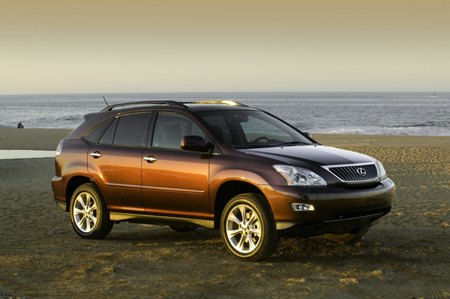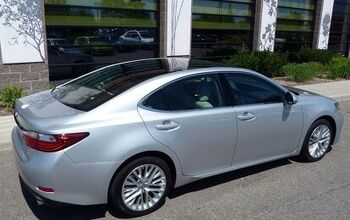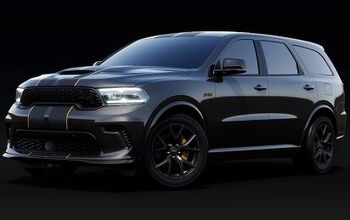Comparo: Lexus RX350 Vs. Hyundai Veracruz

A note to TTAC’s Best and Brightest: if this comparo sounds oddly familiar, that’s because something stinks. But it’s not the husky, malodorous adhesives wafting from the pleather-wrapped Hyundai Veracuz. Nor is it the you-gotta-be-kidding me popularity of a premium-priced Toyota Camry sitting on stilts. The funk comes from mentioning both in the same breath. But I swear on the effeminate grille of a B9 Tribeca that I’ve never read a certain Motor Trend review elucidating this very notion. Fair enough?
Neither model disappoints the crossover breed: the blend of fast curves and a quick D-pillar (of a car-wannabe) work fine with the height advantage (so to speak) of a pretend SUV. Sure, both the Hyundai and Lexus are cursed by the two-box design limitations, but imitation is the sincerest form of flattery: the Korean upstart did a fine job ripping-off the RX 350’s recipe for success.
Until they inevitability park side-by-side at the local grocery store: the Veracruz is the Ugly Betty to the hotness that’s the RX 350’s Hilda Suarez sheetmetal. Sure, the Lexus has a flashier badge, but that expensive dress comes with a slimmer waistline, toned buttocks, and a flirtatious kick-up in the quarter windows. Score one for the original luxo CUV: the bloated, taperless contours of the Veracruz send it deep into undesirable minivan territory.
The race tightens up within the confines of both, provided you have a bad case of Anosmia. The Hyundai’s interior has a fine blend of wood-ish trim, soft vinyl, silver toned plastic and chrome bits. At first glance, the Veracruz interior matches the Lexus RX’s trimmings right down to the electroluminescent logos on the door sills. But the flat-black gauges look somewhat down market, and the smell of The Ghosts of Hyundais Past is (tragically) present and accounted for. Hyundai better take their quality game up from the usual sight, sound and touch parameters, because no other brand competing in the $20,000+ territory has a new car smell this unattractive.
By contrast, the RX 350 is a safe haven for the stressed-out soccer mom archetype, providing the tranquil reassurance of a Japanese rock garden with no empty promises from a presidential campaign. The leather and wood rimmed tiller feels more expensive than any vehicle remotely near its price class. Though Hyundai matches its Japanese role model for interior content (real wood accents notwithstanding), the Lexus simply feels like a more expensive vehicle.
Even with the Hyundai’s larger accommodations, somewhat acceptable 3rd row seating and superior front seat bottoms, this is a no brainer: the Lexus promise of nice trees, fragrant leather, and gorgeous Optitron gauges wins the day.
Motivating the 3800lb RX 350 is Toyota’s corporate 3.5L V6. It sports more power (10hp) than the 3.8L V6 offered in the 4300lb Veracruz. Stomp the RX 350 from a standstill and the front wheels furiously grasp for traction when the motor sings in first gear. Even with an extra forward gear, the Veracruz slowly stately builds steam, unhappily revving to an overburdened power peak. Even if the Veracruz possessed the liquid smooth mill of the RX 350, its extra 500lbs of girth are impossible to mask. Advantage: Lexus.
Luckily the Veracruz’s extra weight translates to a controlled, plush ride on any surface. While RX 350 is soft and spongy, its lack of girth translates into less than inspiring control. With its top-heavy design on float-inducing highways, the Lexus’ cabin briefly gives the sensation of dropping hundreds of feet in a rickety wooden roller coaster, when its front suspension goes from unloaded to loaded. This is an easy win for the big body Hyundai.
On the handling front, let’s call it a draw. The smaller RX 350 cuts a corner with less inertia-fed, front wheel drive push, lowering the holy shit factor for all occupants. But if you think either of these CUVs have a lick of noteworthy dynamic qualities, please broaden your automotive horizons. There’s a reason why Pistonheads lament the (gradual) extinction of the station wagon.
That said, we all know Minivans are the king of carrying mind-numbing amounts of stuff, while almost driving like a car. SUVs haul like nobody’s business and teach smaller, lighter vehicles the cold reality of Newtonian Physics. True to crossover form, the Hyundai Veracruz and Lexus RX 350 do none of the above remarkably well. So there’s no winner?
Negative! At $41k, the nicely loaded Lexus is around $5000 more than a Limited-grade Veracruz. Factor in the stinky interior and the derivative “this ain’t no game-changing Genesis” drive train, and the luxo-budget Veracruz cannot gel for this much coin. So if you (or your significant other) demand a CUV, pimp the ride that’ll instantly impress your friends and neighbors: the Lexus is the winner in this challenge between two whips not likely to be cross-shopped.
[Carmax provided both vehicles, insurance and a tank of gas.]

More by Sajeev Mehta
Latest Car Reviews
Read moreLatest Product Reviews
Read moreRecent Comments
- Zerofoo No, I won't miss this Chevrolet Malibu. It's a completely forgettable car. Who in their right mind would choose this over a V8 powered charger at the rental counter? Even the V6 charger is a far better drive.
- Offbeat Oddity Nope, I won't miss it. I loved the 2008-2012 Malibu, but the subsequent generations couldn't hold a candle to it. I think the Impala was much more compelling at the end.
- Zerofoo An almost 5000 pound hot hatch that fell out of the ugly tree and hit every branch on the way down? No thanks.
- Tassos Jong-iL This would still be a very nice car in North Korea.
- Jeff One less option will be available for an affordable midsize sedan. Not much can be done about GM discontinuing the Malibu. GM, Ford, and Stellantis have been discontinuing cars for the most part to focus on pickups, crossovers, and suvs. Many buyers that don't want trucks or truck like vehicles have moved onto Japanese and South Korean brands. Meanwhile large pickups and suvs continue to pile up on dealer lots with some dealers still adding market adjustments to the stickers. Even Toyota dealers have growing inventories of Tundras and Tacomas.







































Comments
Join the conversation
Regarding the weight issue: I can't comment on Lexus, but Nissan and Honda vehicles are not built with the same robustness as our new Hyundai (Santa Fe). The Hyundai's doors close with a more solid Whump, plastic parts are thicker, and the undercarriage appears sturdier and better sealed. Overall structure is very tight and quiet. Where Hyundai still lags is in the finer points. Suspension technology is good but not great, transmission is smooth but a bit sluggish, and the "luxury" veneer seems a bit thin in places. That - plus the snob factor - is what Hyundai has to overcome in future models.
What this fails to mention is the ride smoothness, wind noise, long-term maintenance and resell value...Hyundai shouldn't even be mentioned in this article, a better comparison would be a Lexus and Mercedes Benz...and my Mercedes had more issues in 18 months then my Lexus ever had. Hands down, it's the RX350 all the way, it's not even close.